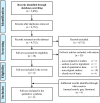Cardiovascular risk associated with high sodium-containing drugs: A systematic review
- PMID: 28683120
- PMCID: PMC5500347
- DOI: 10.1371/journal.pone.0180634
Cardiovascular risk associated with high sodium-containing drugs: A systematic review
Abstract
Background: Excess dietary sodium is associated with increased blood pressure (BP). Some drugs are associated with high sodium intake (in particular effervescent tablets), but the cardiovascular risk associated with such high sodium-containing drugs (HSCD) is largely underevaluated.
Objectives: To summarize the evidence for a potential cardiovascular risk associated with exposure to HSCD, and to highlight possible risk factors associated with this iatrogenic issue; in general and/or specific populations.
Methods: We conducted a systematic review, by searching electronic databases including MEDLINE, EMBASE, Web of Science, CENTRAL and grey literature between 1960 and 2015. We included studies that reported modification of cardiovascular parameters or incidence/prevalence of cardiovascular outcomes, between a group of subjects exposed to HSCD relative to a non-exposed group. The threshold used to identify HSCD was 391 mg/day. We did not consider studies evaluating exposure to sodium as an active ingredient or those focusing on dialysis solutions or enteral/parenteral nutrition. Study quality was assessed using the EPHPP tool.
Results: A total of eight studies met our inclusion criteria. Four reported results for short-term exposure to HSCD (≤ 7 days) on BP fluctuations. One study reported an elevation of BP (associated sodium intake: 1,656 mg/day). Four studies evaluated a long-term exposure (≥ 2 years or discontinuation of a chronic treatment). Two studies reported iatrogenic risk. For these studies, drug associated sodium intake was high (> 1,500 mg/day) in patients with comorbidities (in particular, diabetes mellitus and hypertension).
Conclusion: Despite numerous study limitations, this systematic review suggests three potential synergistic risk factors for cardiovascular complications after exposure to HSCD: a high sodium intake (≥ 1,500 mg/day), a long duration of exposure, and the presence of comorbidities. Further studies are required to characterize this iatrogenic risk.
Trial registration: PROSPERO CRD42016047086.
Conflict of interest statement
Figures
References
-
- Graudal NA, Hubeck-Graudal T, Jürgens G. Effects of low-sodium diet vs. high-sodium diet on blood pressure, renin, aldosterone, catecholamines, cholesterol, and triglyceride (Cochrane Review). Am J Hypertens 2012;25:1–15. doi: 10.1038/ajh.2011.210 - DOI - PubMed
-
- He FJ, Li J, Macgregor GA. Effect of longer term modest salt reduction on blood pressure: Cochrane systematic review and meta-analysis of randomised trials. BMJ 2013;346:f1325 doi: 10.1136/bmj.f1325 - DOI - PubMed
-
- Eckel RH, Jakicic JM, Ard JD, de Jesus JM, Houston Miller N, Hubbard VS, et al. 2013 AHA/ACC guideline on lifestyle management to reduce cardiovascular risk: a report of the American College of Cardiology/American Heart Association Task Force on Practice Guidelines. J Am Coll Cardiol 2014;63:2960–84. doi: 10.1016/j.jacc.2013.11.003 - DOI - PubMed
-
- Guideline: Sodium Intake for Adults and Children. Geneva: World Health Organization; 2012. Available from: http://www.ncbi.nlm.nih.gov/books/NBK133309/ (last access: 19/05/17). - PubMed
-
- Mozaffarian D, Fahimi S, Singh GM, Micha R, Khatibzadeh S, Engell RE, et al. Global sodium consumption and death from cardiovascular causes. N Engl J Med 2014;371:624–34. doi: 10.1056/NEJMoa1304127 - DOI - PubMed
Publication types
MeSH terms
Substances
LinkOut - more resources
Full Text Sources
Other Literature Sources
Medical
Miscellaneous


